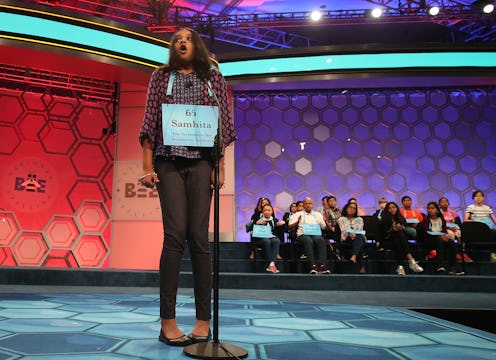News
How Much Spelling Bee Contestants Actually Study Will Make Your Head Spin

The Scripps National Spelling Bee is upon us, meaning this is your chance to see some of the sharpest kids in the country face off in a bout of spelling supremacy. And while you're watching them spell out one impossibly complicated word after another, you might find yourself wondering: how much do spelling bee contestants study? Just how much time and effort does it take to compete against the best?
It's a massive undertaking, make no mistake. There isn't an ironclad, definitive answer to this question, as different competitors will have different approaches to preparing for the big event. For some top-level spellers, however, the training schedule can be downright intense.
For example, according to CBS News, 2004 Scripps National Spelling Bee champ David Tidmarsh studied seven days a week for months upon months, even working through illness to prepare himself for the contest. It ultimately paid off, needless to say, as he took home the trophy after correctly spelling the word "autochthonous," a noun referring to an indigenous resident of a place.
The father of the 2012 winner, Snigdha Nandipati, also revealed that she trained with a staggering 30,000 flash cards, a practically unthinkable number, and definitely a tall order as far as time consumed is concerned.
In short, being a spelling bee champion not an ambition for anyone who can't bear the thought of studying (let alone that much, and for that long), because success at the highest level takes a whole lot of it. Virtually any word can get thrown at you at any time, and you need to have put in the hours to either know exactly how to spell it, or how to make the best possible guess.
A brief rundown of the winning words from the last several Scripps National Spelling Bees really hammers home just how high the degree of difficulty is, and why it takes such an incredible amount of studying to succeed:
- In 2017, Ananya Vinay won the bee on the word "marocain."
- In 2016, the bee ended in a tie, with Nihar Saireddy Janga finishing on the word "gesellschaft" and Jairam Hathwar finishing on the word "Feldenkrais."
- In 2015, the bee ended in a tie, with Vanya Shivashankar finishing on the word "scherenschnitte" and Gokul Venkatachalam finishing on the word "nunatak."
- In 2014, the bee ended in ― you guessed it ― a tie. Ansun Sujoe finished with the word "feuilleton," while Sriram Hathwar finished with the word "stichomythia."
- In 2013, Arvind Mahankali won the bee on the word "knaidel."
- In 2012, the aforementioned Snigdha Nandipati won the bee on the word "guetapens."
In short, these are hard words, ones that most people have probably nevever even heard of before. What's "feuilleton" mean? Do you know? Does anyone know? Well, according to Merriam-Webster, it's a noun referring to a "part of a European newspaper or magazine devoted to material designed to entertain the general reader." But even if you knew that, could you spell it? Not very likely.
But that's exactly the kind of challenge participants in this year's spelling bee, hailing from schools all across the country, will be taking on this week. If you're interested in watching all the drama, intensity, and yes, heartbreak, you won't have to wait much longer.
The 2018 Scripps National Spelling Bee is being held in Maryland, from Tuesday, May 29 through Thursday, May 31. The competition is aired live on ESPN, and you can also watch online through the ESPN app. The closing finals round will be held on Thursday night, from 8:30-10:30 p.m. ET, so make sure you don't miss it.